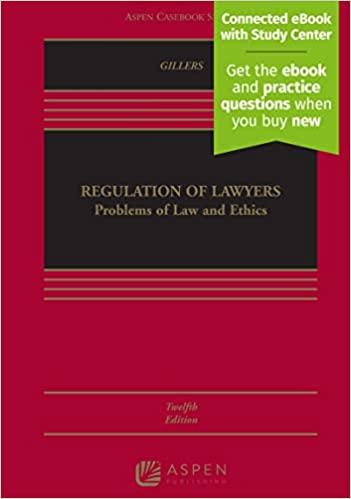Question
Which of the following is an example of the principle of common but differential responsibility? Group of answer choices A. The Montreal Protocol's multilateral fund
Which of the following is an example of the principle of common but differential responsibility?
Group of answer choices
A. The Montreal Protocol's multilateral fund to assist developing countries with CFC reduction
B. The Kyoto Protocol's exclusion of developing countries from binding emissions targets
C. The Paris Agreement's direction to states to calculate their NDCs in light of their capabilities and historic responsibility for climate change
D. All of the above
2. Who holds obligations under international human rights law?
Group of answer choices
A. Individuals
B. States
C. Non-governmental organizations
D. The UN Commission on Human Rights, if states have signed on to the Optional Protocol
3. Using a statistical analysis, Cole finds that membership in the International Covenant on Civil and Political Rights does not independently improve human rights practices in states.
Group of answer choices
True
False
4. Following increasing tensions with the ICC in the mid-2010s, several African countries initiated withdrawal proceedings from the Rome Statute. As of 2022, only Burundi has withdrawn from the Rome Statute.
Group of answer choices
True
False
5. The majority of African states have opposed the ICC since the negotiations began in Rome in the late 1990s to create the court.
Group of answer choices
True
False
6. What is the TWAIL critique of the principle of complementarity in the Rome Statute?
Group of answer choices
1. Because complementarity allows the ICC only to act when national courts fail to act, it privileges developed countries that tend to have advanced judicial institutions
2. Because complementarity allows the ICC only to act when national courts fail to act, it privileges developing countries that tend to have less advanced judicial institutions
3. Because complementarity requires the ICC to hear cases alongside national courts, it privileges developed countries that tend to have advanced judicial institutions
4. Because complementarity requires the ICC to hear cases alongside national courts, it privileges developing countries that tend to have less advanced judicial institutions
7. Once states have signed and ratified an international treaty, what action, if any, can they take to no longer be bound by the treaty's legal obligations?
Group of answer choices
A. If a state has signed and also ratified a treaty, it cannot terminate its obligations under the treaty
B., While it is possible for states to withdraw from treaties, it is rare because it must be approved by the ICJ
C. States can generally withdraw from treaties, if they follow the treaties' requirements for withdrawals
D. States can generally withdraw from treaties, but only if all other parties to the treaty consent
8. The ICJ is currently presiding over two important cases: The Gambia v. Myanmar and Ukraine v. Russia. What is the source of the ICJ's jurisdiction in these cases?
Group of answer choices
A. The court has refused jurisdiction in both cases
B. The Gambia and Myanmar have made a special agreement for the court to hear their dispute; the court's jurisdiction over Ukraine and Russia's dispute is based on a compromissary clause
C. The Gambia, Myanmar, and Ukraine have signed on to the optional protocol; jursidiction over Russia is based on forum prorogatum
D. In both cases, the court's jurisdiction is based on a compromissory clause
Step by Step Solution
There are 3 Steps involved in it
Step: 1

Get Instant Access to Expert-Tailored Solutions
See step-by-step solutions with expert insights and AI powered tools for academic success
Step: 2

Step: 3

Ace Your Homework with AI
Get the answers you need in no time with our AI-driven, step-by-step assistance
Get Started


